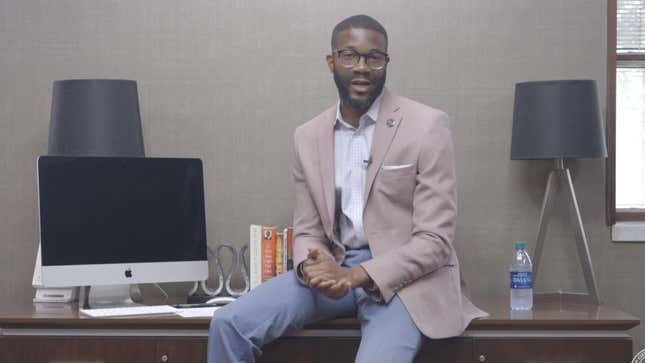
The mayor of the third blackest city in America unveiled a plan that could fundamentally transform the future of the next generation with the promise of a debt-free college education.
On Tuesday, Aug. 27, Birmingham, Ala., residents received a stunning announcement when Mayor Randall Woodfin tweeted that graduates of Birmingham City Schools will have the opportunity to attend college in the state without the burden of tuition
The next day, Woodfin revealed the details of the city’s Birmingham Promise initiative, which guarantees college tuition for every single one the city’s public high school graduates who are accepted to an in-state, public, two or four-year college. The plan also provides high school juniors and seniors with the opportunity to receive credit hours for completing apprenticeships at local businesses, while earning a guaranteed minimum wage of $15 per hour.
In an exclusive conversation with The Root, the 38-year-old mayor explained that he had been searching for innovative solutions to tackle the combination of generational poverty, livable wages and college affordability since he began serving as the city’s school board president in 2013.
“For the last six years I have been researching ways to bring opportunities to Birmingham graduates,” said Woodfin. “That’s when I stumbled across the Kalamazoo Promise.”
In 2005, a small group of anonymous donors began funding the college tuition of graduates in the city of Kalamazoo, Mich. To date, the fund has shelled out $117 million in scholarships, sending more than 7,000 students to two and four-year colleges in the state.
“They got a little lucky,” explained Woodfin. “They had a billionaire who was willing to endow their fund. I wanted to figure out Birmingham’s version of that because there is no billionaire walking around.”
Birmingham’s version is a true public-private partnership. The city has committed to a $2 million initial investment in the proposal, which is expected to cost between $6 and 8 million dollars per year. The United Way will serve as the fiscal agent for the initiative and hopes to raise $35-to-$50 million to endow the fund.
The plan will offer “last dollar” funds to cover the remaining balance after grants and scholarships have been applied to the tuition of students who attended Birmingham City Schools for all 12 years. Students who attended BCS for less than 12 years will receive a proportional amount of funding (for instance, Birmingham Promise would pay half the tuition of a student who graduated from a BCS school after six years of attendance.)
“I was surprised at how little it was,” Woodfin told The Root. “I thought it was going to be some astronomical number. We’re always in the top 10 most giving cities in America. We give to all types of causes—arts, the zoo, sports, entertainment. In my mind it’s simple—If we can find money to give to all these things, then dammit, we can find money to give to our most vulnerable and our youngest generation.”
The first-term mayor explained that scholarships will serve as a lifeline to first-generation college students, most notably the 45 percent of the district who live below the poverty line. Students in the apprenticeship program will earn $7.50 per hour from the city and an additional $7.50 per hour from private employers, totaling $15 per hour.
In 2016, Birmingham’s city council voted to raise the minimum wage to $10.10 per hour but the measure was blocked by the state legislature and is now before a federal appeals court. Woodfin’s plan offers creative solutions to the national conversation about livable wages and college debt. Sen. Bernie Sanders, who supported Woodfin’s campaign in 2017, lauded the idea.
In 2018-19, Birmingham City Schools served 24,053 students, 91 percent of whom are black, according to Public Schools Review. The district has a graduation rate of 77 percent but, according to the Alabama Department of Education, only 49 percent of BCS students who finished school in 2018 were prepared for college or a career.
Asked how the city residents will benefit from Birmingham Promise, Mayor Woodfin reeled off the benefits of the groundbreaking initiative:
“It creates a trained, more educated workforce. It decreases illiteracy. It increases opportunity. It decreases crime. It increases the number of business owners. It increases property value.
“In my opinion, the only way we change the state of black America is by making real, tangible investments in our youngest generation,” Woodfin added. “This has the fundamental capacity to literally change the quality of life, not just for these young people but for their families, which in turn changes the quality of life for the communities and neighborhoods they live in, which in turn changes the quality of life for the entire city.”

